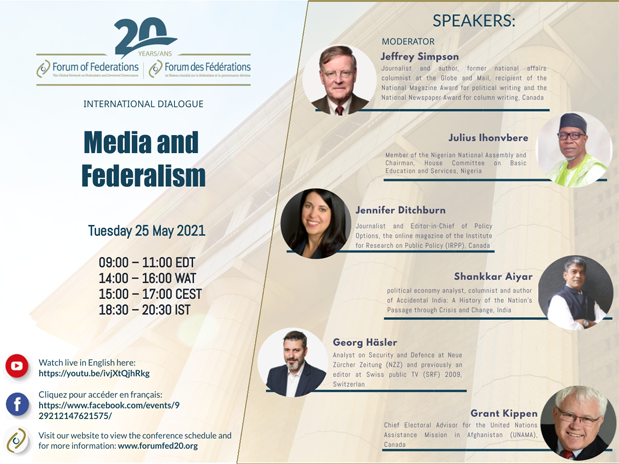
English: https://www.youtube.com/watch?v=ivjXtQjhRkg
Français: https://www.facebook.com/events/929212147621575/
Federal states are often complex for citizens/taxpayers to figure
out. They ask themselves: Which level of government is responsible for what?
Which is taxing me, and for what? To whom do I complain, or whom do I praise?
Explaining federalism falls on the media, but in this
world of people wanting instant news, explaining these complexities accurately
becomes challenging. That the media would dive into the complexities of
“equalization payments,” for example, which may total billions of dollars and
keep various subnational budgets afloat, presumes the subject can be easily
explained in ways that non-experts might understand. These assumptions can
sometimes lead to inaccurate understanding or analysis.
The media, in Canada as in other federations, is split
between regional and national outlets. As such, the split reflects the
constitutional nature of federalism and the facts of population dispersal. In
such circumstances, the media can sometimes reflect its local audience’s
interests and perceptions more than challenging them.
In Canada – as in other countries – both national and
regional media outlets have been shrinking as the media suffered huge losses in
advertising and experience the younger generation’s preference for digital
media. In the early years of the digital era, newspapers assumed that
advertising would follow as eyeballs moved from the printed page to the screen.
That assumption proved faulty and papers were forced to charge for access to
their digital edition. But especially young readers had become so accustomed to
getting news for free on television or the digital giants such as Google that
they balked at paying for newspapers online.
What do these changes mean for media coverage in a
federal country? Fewer journalists mean less news about everything from courts
to politics, sports to culture, business to city governments. How will this
impact on perceptions and understanding of federalism? And what impact could
this have on citizen’s knowledge of governance issues and the accountability of
governments in federal systems?
For all details, please visit: www.forumfed20.org

